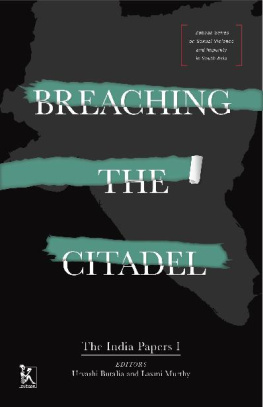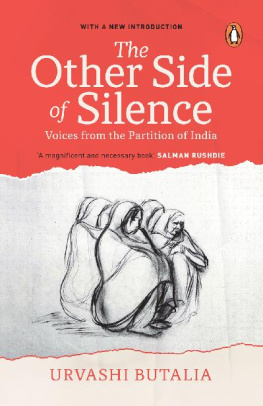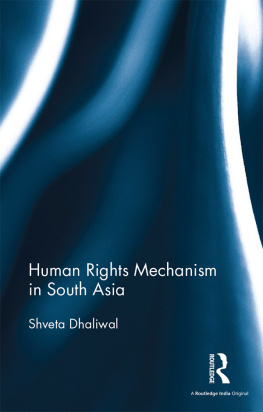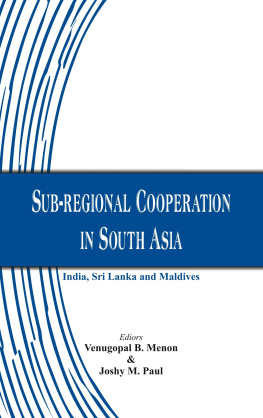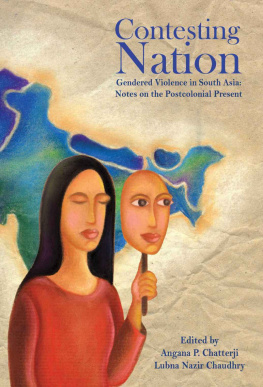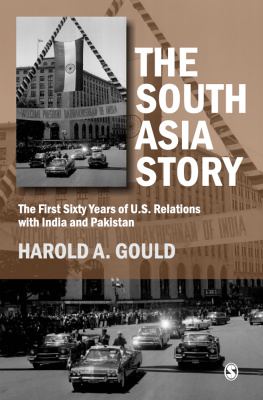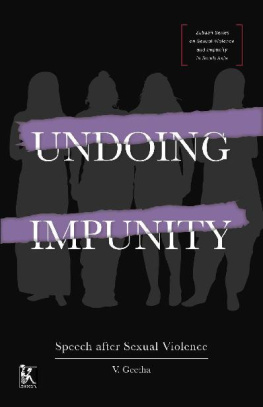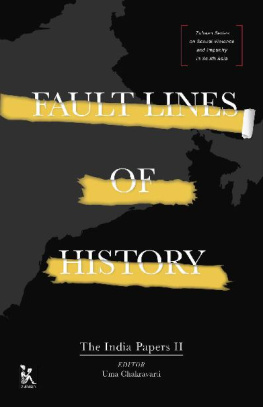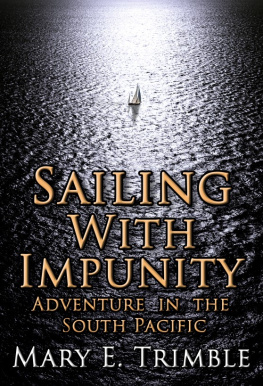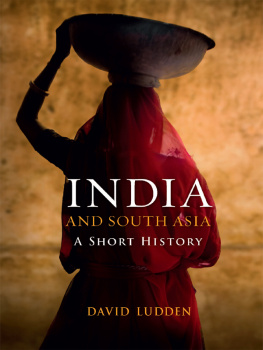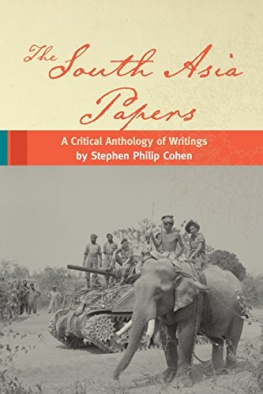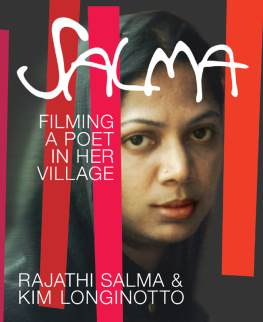Breaching the Citadel
The India Papers I
B reaching the Citadel is part of Zubaan's Sexual Violence and Impunity in South Asia series. It showcases new and pathbreaking research on the structures that contribute towards creating and sustaining impunity for perpetrators of sexual violence. Focusing on medical protocols, the functioning of the law, the psycho-social making of impunity, the media., history and current politics, the book makes a valuable addition to work on Kashmir, the Northeast of India, Chhattisgarh and other regions of violence that are discussed in its sister publication, Fault Lines of History. This book is a must-read for students of women and gender studies, conflict, development, history, current politics and sexuality studies.
EDITORS : Urvashi Butalia | Laxmi Murthy
CONTRIBUTORS : Temsula Ao | Divya Arya | Urvashi Butalia | Uma Chakravarti | Rajashri Dasgupta | Padma Bhate-Deosthali | Neha Dixit | Bani Gill | Vrinda Grover | Suzette Jordan | Christine Marrewa Karwoski | Laxmi Murthy | Farah Naqvi | Kavita Panjabi | Jagadeesh Narayan Reddy | Sangeeta Rege | Meena Saraswathi Seshu | Navsharan Singh | Shobhna Sonpar
About the Editors
Urvashi Butalia is the director and founder of Zubaan, and the author and editor of numerous books, including The Other Side of Silence: Voices from the Partition of India and Partition: The Long Shadow . She has co-edited Women and the Hindu Right: A Collection of Essays and In Other Words: New Writing by Women in India . She has been active in the women's and civil rights movements in India, and writes on issues relating to women, media, and communalism.
Laxmi Murthy is Contributing Editor at Himal Southasian , the region's only political review magazine. She also heads the Hri Institute for Southasian Research and Exchange, a unit of the South Asia Trust, Kathmandu. She is deputy coordinator of the Sexual Violence and Impunity Project at Zubaan. She has authored Four Years of the Ceasefire Agreement between the Government of India and the National Socialist Council of Nagalim: Promises and Pitfalls , with Ram Narayan Kumar. She is co-author, with Rajashri Dasgupta, of Our Pictures, Our Words: A Visual Journey Through the Women's Movement (Zubaan, 2011). She has co-edited, with Meena Seshu, The Business of Sex (Zubaan, 2013), and with Mitu Varma, Garrisoned Minds: Women and Armed Conflict in South Asia (2016).
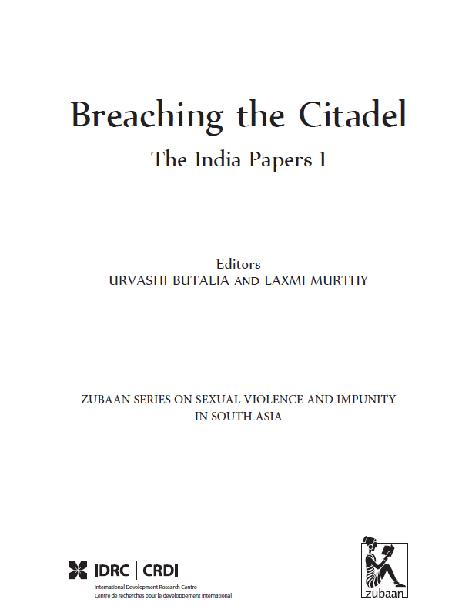
Zubaan
128 B Shahpur Jat, 1 st floor
NEW DELHI 110 049
Email:
Website: www.zubaanbooks.com
First published by Zubaan 2018
Copyright Zubaan 2018
All rights reserved
This project was undertaken with financial support provided by the International Development Research Centre, Canada
10 9 8 7 6 5 4 3 2 1
eBook ISBN: 9789385932755
Print source ISBN: 9789384757786
This eBook is DRM-free.
Zubaan is an independent feminist publishing house based in New Delhi with a strong academic and general list. It was set up as an imprint of Indias first feminist publishing house, Kali for Women, and carries forward Kalis tradition of publishing world quality books to high editorial and production standards. Zubaan means tongue, voice, language, speech in Hindustani. Zubaan publishes in the areas of the humanities, social sciences, as well as in fiction, general non-fiction, and books for children and young adults under its Young Zubaan imprint.
Printed and bound at Raj Press, R-3 Inderpuri, New Delhi 110 012
Hello Reader!
This is just a note to let you know that all Zubaan ebooks are completely free of digital rights management (that is, DRM-free), so that you can read them on any of your devices and download them multiple times. We believe that this makes for a more trouble-free and pleasurable reading experience. To be fair to our authors and to enable us to continue publishing and disseminating their work, we appeal to you to buy copies of this ebook rather than share or give it away free. Thank you for your support and cooperation. And happy reading!
Contents
Urvashi Butalia, Laxmi Murthy and Navsharan Singh
Temsula Ao
Urvashi Butalia and Laxmi Murthy
Kavita Panjabi
Rajashri Dasgupta
Bani Gill
Meena Saraswathi Seshu and Laxmi Murthy
Neha Dixit
Padma Bhate-Deosthali, Sangeeta Rege and Jagadeesh Narayan Reddy
Shobna Sonpar
Divya Arya
Uma Chakravarti and Farah Naqvi
Uma Chakravarti and Urvashi Butalia
Rajashri Dasgupta
Urvashi Butalia
Zubaan Series on Sexual Violence and Impunity in South Asia
An Introduction
URVASHI BUTALIA, LAXMI MURTHY and NAVSHARAN SINGH
T he Sexual Violence and Impunity project (SVI) is a three-year research project, supported by the International Development Research Centre (IDRC), Canada, and coordinated by Zubaan. Led by a group of nine advisors from five countries (Bangladesh, India, Nepal, Pakistan, Sri Lanka), and supported by groups and individuals on the ground, the SVI project started with the objectives of developing and deepening understanding on sexual violence and impunity in South Asia through workshops, discussions, interviews and commissioned research papers on the prevalence of sexual violence, and the structures that provide impunity to perpetrators in all five countries.
The project began with some key questions and concerns. We noted that recent histories and contemporary political developments in South Asia had shown an exponential increase in sexual violence, particularly mass violence. And yet, even as such violence had increased across the region, so had the ever-deepening silence around it.
Why, for example, had the end of 25 years of violent conflict in Sri Lanka in May 2009 not resulted in an open and frank discussion about sexual violence as a weapon of war? Why had the International Crimes Tribunal (ICT) of Bangladesh, set up in 2009 to investigate and prosecute suspects for the genocide committed in 1971 by the Pakistan army and their local collaborators, paid such little attention to the question of mass rape, despite it being widely acknowledged that it had happened and many women having spoken out about it? Why did discussions on Kashmir in India or Swat in Pakistan, simply ignore the question of sexual violence? Why was caste violence, violence against sex workers and men and transgender persons barely spoken about?
Nor was silence the only issue here. Crucial to maintaining the silence wasand isthe active collusion of states in providing impunity to perpetrators, sometimes under the guise of protective laws and special powers to the armed forces, at others under the guise of nationalism. So heavily were the odds stacked against women that, until recently, very few had dared to speak out. Backed by culture, and strengthened by the state, and often with the active collusion of non-state actors, impunity then, remained largely unchallenged.
We asked ourselves if these conditions were specific to the South Asian region. Elsewhere in many parts of the world, we noted, rape was increasingly being discussed and accepted, not only as a weapon of war, but also as a crime against humanity and as an instrument of genocide. The 1998 Akeyesu judgment by the International Criminal Tribunal for Rwanda (ICTR) provided a clear definition of rape and delineated its elements as a crime against humanity and as an instrument of genocide. In the International Criminal Tribunal for the former Yugoslavia (ICTY) jurisprudence pioneered the approach that used acts of rape and other forms of sexual violence to include elements of other international crimes such as torture, enslavement, and persecution, which previously had not been litigated in the context of gender violence.

